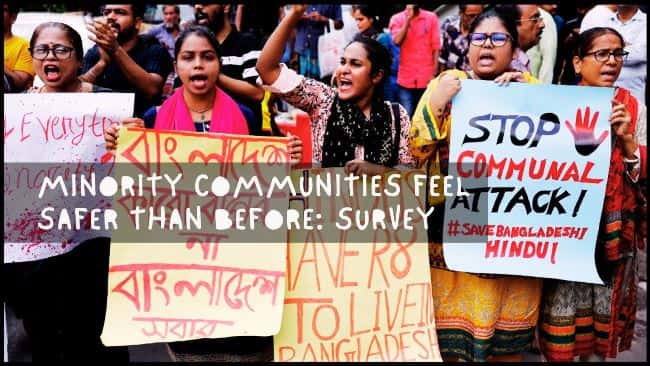Minority Communities Feel Safer Than Before: Survey
Minority Communities Report Improved Safety in Bangladesh: Survey Finds Positive Trend

A survey conducted by Voice of America reveals that a majority of Bangladeshis believe the interim government is providing better security to religious and ethnic minorities compared to the previous Awami League government. However, the survey indicates some differences in perceptions between Muslim and non-Muslim respondents regarding safety.
The survey, conducted at the end of October, found that 64.1% of respondents think the interim government is offering greater security to minority communities compared to the Awami League’s tenure. Meanwhile, 15.3% feel that the current government is doing worse in ensuring safety for minorities, and 17.9% believe the situation remains the same.
The survey included 1,000 respondents, carefully selected to reflect Bangladesh’s demographics. Among them, 92.7% were Muslim, with an equal distribution of men and women. Over half of the respondents were below 34 years of age, and nearly a quarter resided in urban areas.
Decline Followed by Improvement
After the fall of the Awami League government on August 5, incidents of retribution significantly impacted religious minorities, particularly Hindus. Homes, businesses, and places of worship belonging to minorities were vandalized or set ablaze in various parts of the country.
“We have observed attacks on minorities, sometimes for political affiliations and sometimes simply because they are minorities,” said human rights activist Nur Khan Liton. “In Panchagarh, Ahmadi residences were targeted and set on fire.”
Highlighting the challenges faced by minorities in Bangladesh, Meenakshi Ganguly, South Asia director of Human Rights Watch, remarked, “Governments rarely take substantial steps to protect their rights.” She pointed to issues faced by indigenous communities in the Chittagong Hill Tracts, Hindus, and Ahmadiyya Muslims as examples.
However, since the interim government, led by Dr. Muhammad Yunus, assumed power, efforts have been made to address these challenges. Administrative actions, community initiatives, and protection of places of worship have reportedly improved the situation within a month of heightened unrest.
“Some commendable steps have been taken by individuals, political parties, and religious groups, leading to a noticeable improvement,” said Nur Khan, now a member of a newly established commission on enforced disappearances.
Differences in Perception
Despite the overall improvement, there remain significant differences in perceptions between Muslims and non-Muslims. Among Muslim respondents, only 13.9% believe the current situation is worse than before. However, 33.9% of religious minority respondents feel the interim government is doing worse than the Awami League in ensuring their safety.
Joya Sarker, a Dhaka resident and NGO worker, shared her growing concerns about safety. “Previously, I could return home late at night with my daughter without any worries. Now, even returning at 8 p.m. makes me anxious,” she said.
Meanwhile, 66.1% of Muslim respondents believe the interim government is providing better security to minorities than the Awami League. However, only 39.5% of religious minority respondents share this view.
Lingering Concerns Despite Progress
Some minority communities express cautious optimism. “During the Awami League’s tenure, its activists often coerced Hindus to sell their land at low prices. With them gone, there’s some relief,” said Joya Sarker. Similarly, Hiren Pandit, a program coordinator from a rural area, noted that army deployments have improved security since August and September.
However, uncertainties remain. “Our village homes were burned down, and we still live in fear about our safety,” said Hiren. International concerns have also risen over the spike in violence against minorities following the government transition. Both the Indian Ministry of External Affairs and U.S. Secretary of State Antony Blinken have expressed their concerns during discussions with Bangladeshi leaders.
Need for Further Action
While the interim government has labeled the violence as “isolated incidents” and claimed reports of minority persecution are “exaggerated,” human rights activists stress the need for sustained efforts to reassure minority communities.
“Trust-building among minorities will depend on the actions taken over the next 6 to 9 months,” said Nur Khan. Activists also believe that both the government and political leaders must take visible steps to ensure the rights and safety of minorities, fostering confidence in a more inclusive future.


